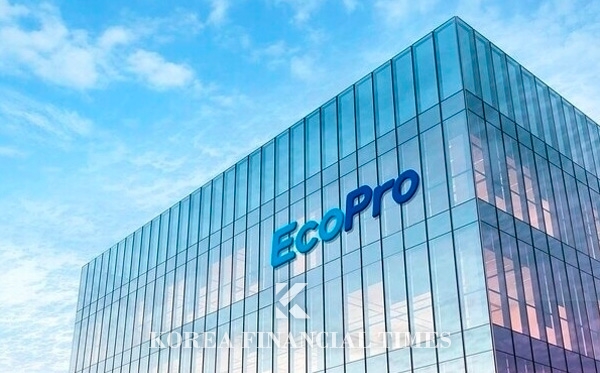
According to the Korea Exchange, the KRX Secondary Battery TOP 10 Index, which includes 10 major domestic secondary battery companies, closed at 3638.55, down 2.87% from the previous day's close at 3745.95. The trading volume was 3.99 million shares and the trading value was KRW 70.39 billion.
By index component, the biggest decline was recorded by the three Ecopro brothers. EcoProperty ended the day at 81,000 won, down 4.48% from the previous trading day (84,800 won), while the shares of EcoProbium and EcoPro also fell 4.05% and 3.95%, respectively. In addition, Samsung SDI (-3.33%), LG Energy Solution (-2.7%), L&F (-2.4%), Fosco Future M (-1.86%), and SK innovation (-0.1%) fell together. SK E&T (+0.54%) and LG Chem (+0.16%) were slightly higher.
The companies' recently announced second-quarter results fell short of market expectations. On Monday, EcoPro reported consolidated revenue of 864.1 billion won in the second quarter of this year, down 57% from the same period a year earlier. The operating loss was 54.6 billion won, down from 170.3 billion won in the year-ago quarter.
During the same period, EcoProBMs sales and operating income fell 57.5% and 96.6% year-on-year to 809.5 billion won and 3.9 billion won, respectively. For EcoProMaterials, sales fell 76.9% year-on-year to KRW66.7 billion, and operating losses were KRW3.7 billion. POSCO FutureM's operating profit plunged 94.8% in the second quarter, while LG Energy Solutions and Samsung SDI also saw their profits shrink by 57.5% and 37.8%, respectively.
The news of Tesla's massive recall in the U.S. also added to the bad news. According to the National Highway Traffic Safety Administration (NHTSA), Tesla has identified a problem with software in some of its vehicles that fails to detect when the hood is open and has recalled about 1.85 million vehicles potentially affected by the issue. This sent Tesla's stock price plunging 4.08%.
In addition, with the uncertainty of the U.S. presidential election in November, experts advised against chasing battery-related stocks. “The electric vehicle and battery industry will be hit hard if Trump is elected, and the current growth can only be sustained if Vice President Harris is elected,” said Han Byung-hwa, a researcher at Eugene Investment & Securities. ‘Considering the companies’ short-term business conditions and earnings estimates are being lowered, a conservative approach is recommended.”
“Assuming a Harris victory, we believe EV and battery stocks at current low valuations can be bought on a medium- to long-term basis, while higher valuations remain at risk of share price declines.”
“The second quarter of this year saw a prolonged period of sluggish global EV sales, with shipments beginning to decline even for companies that have been holding up well,” said Jeon Hye-young, a researcher at Daol Investment & Securities. ”The impact of lower selling prices due to falling metal prices is expected to continue into the second half of the year, and unless there is a rebound in sales, the market is likely to remain in a period of negative growth.”
“EV strategies of major OEMs continue to be revised and downgraded,” said Jeon, adding, ”We recommend a conservative approach at least until a rebound in shipments from cell makers is confirmed.”
On the other hand, Changmin Lee, a researcher at KB Securities, said, “The secondary battery sector is expected to see an upward trend in stock prices if the Democratic Party wins the U.S. presidential election in three months' time.” “With expectations of interest rate cuts and competitive new car launches, the secondary battery sector could see an uptick in stock prices if the popularity of the Democratic alternative candidate increases.”
Jeon HanSin (pocha@fntimes.com)





























!['KB와 손 잡은' 가상자산 거래소 빗썸, 1위 추격 가속…점유율 지각변동 최전선 [가상자산 통신]](https://cfnimage.commutil.kr/phpwas/restmb_setimgmake.php?pp=006&w=69&h=45&m=5&simg=202409250721590135522f8e8c22c175114235199.jpg&nmt=18)


![압구정 '현대13차' 35평, 6.6억 오른 50억에 거래 [일일 아파트 신고가]](https://cfnimage.commutil.kr/phpwas/restmb_setimgmake.php?pp=006&w=69&h=45&m=5&simg=20231108083323039755e6e69892f222110224112.jpg&nmt=18)
![[DCM] 코웨이 · SK가스 · 롯데렌탈, 올해 첫 회사채 공모](https://cfnimage.commutil.kr/phpwas/restmb_setimgmake.php?pp=006&w=69&h=45&m=5&simg=2025011410192102319141825007d12411124362.jpg&nmt=18)
![[DCM] 롯데렌탈, 그룹 지원보다 사모펀드 ‘볼트온’ 긍정 평가](https://cfnimage.commutil.kr/phpwas/restmb_setimgmake.php?pp=006&w=69&h=45&m=5&simg=2025011510313905237c1c16452b012411124362.jpg&nmt=18)

















![[카드뉴스] 국립생태원과 함께 환경보호 활동 강화하는 KT&G](https://cfnimage.commutil.kr/phpwas/restmb_setimgmake.php?pp=006&w=298&h=298&m=1&simg=202403221529138957c1c16452b0175114235199_0.png&nmt=18)
![[카드뉴스] 신생아 특례 대출 조건, 한도, 금리, 신청방법 등 총정리...연 1%대, 최대 5억](https://cfnimage.commutil.kr/phpwas/restmb_setimgmake.php?pp=006&w=298&h=298&m=1&simg=20240131105228940de68fcbb35175114235199_0.jpg&nmt=18)
![[카드뉴스] 어닝시즌은 ‘실적발표기간’으로](https://cfnimage.commutil.kr/phpwas/restmb_setimgmake.php?pp=006&w=298&h=298&m=1&simg=202311301105084674de68fcbb35175114235199_0.png&nmt=18)
![[신간] 사모펀드 투자와 경영의 비밀](https://cfnimage.commutil.kr/phpwas/restmb_setimgmake.php?pp=006&w=81&h=123&m=5&simg=2024102809331308730f8caa4a5ce175114235199.jpg&nmt=18)
![[신간]퍼스널브랜딩, 문학에서 길을 찾다](https://cfnimage.commutil.kr/phpwas/restmb_setimgmake.php?pp=006&w=81&h=123&m=5&simg=2024102214123606876f8caa4a5ce175114235199.jpg&nmt=18)
![[서평] 추세 매매의 대가들...추세추종 투자전략의 대가 14인 인터뷰](https://cfnimage.commutil.kr/phpwas/restmb_setimgmake.php?pp=006&w=81&h=123&m=5&simg=2023102410444004986c1c16452b0175114235199.jpg&nmt=18)

![[신간] 김국주 전 제주은행장, ‘나는 시간을 그린다 1·2’ 에세이 출간](https://cfnimage.commutil.kr/phpwas/restmb_setimgmake.php?pp=006&w=81&h=123&m=5&simg=2024111517430908074c1c16452b012411124362.jpg&nmt=18)

![[AD] 기아, 혁신적 콤팩트 SUV ‘시로스’ 세계 최초 공개](https://cfnimage.commutil.kr/phpwas/restmb_setimgmake.php?pp=006&w=89&h=45&m=1&simg=2024123113461807771f9c516e42f12411124362.jpg&nmt=18)
![[AD] 아이오닉5 '최고 고도차 주행 전기차' 기네스북 올랐다...압도적 전기차 입증](https://cfnimage.commutil.kr/phpwas/restmb_setimgmake.php?pp=006&w=89&h=45&m=1&simg=2024123113204707739f9c516e42f12411124362.jpg&nmt=18)






